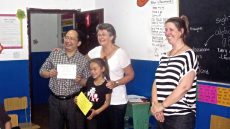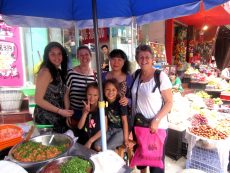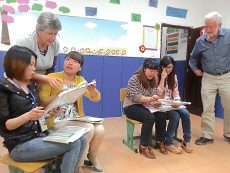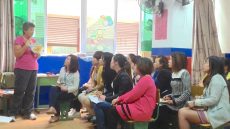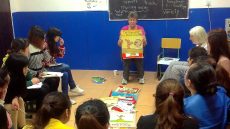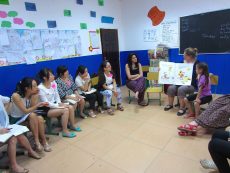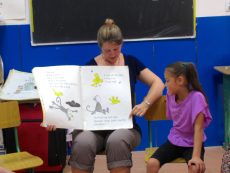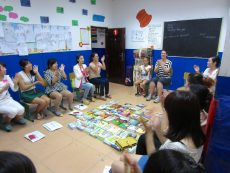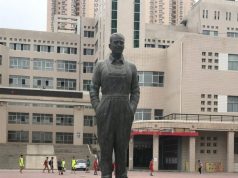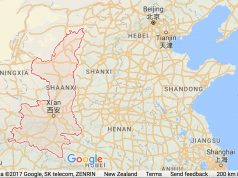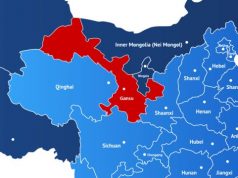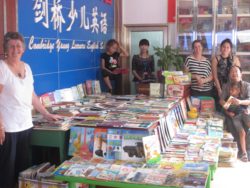
The biggest problem facing the Chinese when learning English is to speak the language naturally. This may sound obvious but often the reason is the way it is taught.
If one considers that young Chinese children have first to learn their own huge number of characters and tones and then, in a few short years, they are required to learn an entirely new alphabet system of written words and cadence of speaking, the problem becomes clear.
To make matters worse, the usual way of teaching English in China is by rote – set sentences on a screen repeated over and over again! Oral dialogue and written sentences are memorised often with very little understanding and phrases that sometimes seem nonsense are repeated parrot fashion. This is not the way that children learn to speak naturally and some of our NZCFS members set about promoting the way that the Kiwis do it, at a school in Bazhong, N.E. Sichuan Province, with outstanding success!
In January 2001, Rosy Look, from Manawatu branch of NZCFS, went to Mianyang, Sichuan Province, to teach English for a few weeks with Jan McLeod and Graham Jackson (of Whanganui branch) and Teacher Manager John He Jianxin. She has kept in touch with them ever since.
John and Graham worked together in the past on various projects teaching children English. John came to NZ to visit Graham when he was ill and, while he was in New Zealand, John visited several primary schools in Whanganui where he observed the teaching of reading in the classrooms. John was impressed and determined to try it back home in China.
John He Jianxin is the owner and principal of the Bazhong ‘Cambridge Young Learners English School’, a private fee-paying English school, which is open evenings and weekends, where the various age groups can attend for about 3 hours per week. His aim is to teach the children to read English with comprehension, and to speak English naturally and competently – to understand foreigners when they speak to them.
First visit to Baozhong
After Graham’s death, in 2012, to fulfill Graham’s wishes of continuing Chinese children’s English learning, Jan asked Rosy if she was interested in going to Bazhong, north eastern Sichuan Province, to work with John He, whom she had worked with in Mianyang, and more recently caught up with in 2011. John wanted his teachers to have some insight into the NZ way of teaching reading English to primary children. Jan, Rosy and another teacher, Sue Davis, flew to Chengdu and then by bus to Bazhong. The latter was quite a trip due to poor infrastructure and a long traffic jam, making the normally 6 hours journey, almost 8 hours. They paid for their own fares and volunteered their time and John He financed their accommodation, food and entertainment.
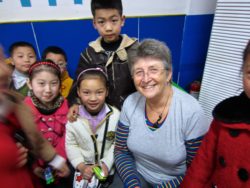
On the first day, they were taken to observe in the Enyang Primary School. The Kiwi teachers were mobbed by the kids, who were fascinated by the long-nosed, white-faced ‘laowai’. (Although more and more foreigners are visiting China, NW and Central China is still very much remote and not covered on many tours. )
The Kiwis watched one of the Chinese teachers struggling to control a class of 86 very noisy children with only one teacher aide to help. They had been told that a Chinese teaching guru had theorised that children should shout their English responses based on the theory that this would make them less self-conscious!
The Kiwi teachers found that kids often came up to them in the street wanting to talk but found they could do no more than “My name is…..”. Unfortunately, the exam system is the most important goal for the parents and they naturally insist that the children follow the curriculum set down by the government so that their children will pass the exams. Those in Central China have to compete with those from the Eastern seaboard who have plenty of access to native English speakers and who come from wealthier homes. All of John’s teachers are from local areas, but the exams are State exams, giving the East a distinct advantage.
Approximately 15 young women taught in the evenings and weekends who, when they met the Kiwis, became really enthusiastic about the new methods. Their level of written English was quite low and full of grammatical errors, but the Kiwis insisted that they speak only English in the staff room which improved the quality of their spoken English.
It is interesting to note that when asked if he minded if his teachers left to teach these new methods elsewhere, his answer was “if it improves the general knowledge of my area, I am happy”. He also hoped to arrange trips to NZ for some of the longer-serving staff.
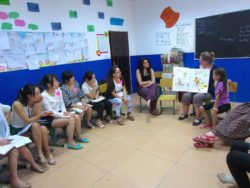
The teachers set about organising the classrooms that the teachers worked in. Traditionally they were very narrow, no pictures, words or displays on the walls. A TV above the blackboard provided the teachers with a Powerpoint presentation to demonstrate their tuition. The Kiwis knew this was not a good technique and so they began with a fun activity such as ‘Simon Says’. They then divided the teachers into groups to tell each other a story. Later, this exercise could be done in groups, pairs or individually with the children.
Later in the week, they got the teachers to record the stories and make corrections and eventually the stories were accumulated into a diary or big book for reading. They cut up the stories and had competitions for the children to put the words back into the correct order and had lots of co-operative and competitive games: matching sentences, vocabulary games, word families and then making resources. They developed the rhythm of the English language with singing, moving away from the chants that so often are used traditionally. The Kiwis used many other ideas to encourage the teachers, and ultimately the children, to speak naturally.
The results were so outstanding that John He invited the same teachers back again in 2013, at his expense. This time Jan suggested that, as well as Sue Davis, Rosy should take her daughter, Emily, an English and Drama teacher at Tararua College in Pahiatua. She has also had experience of teaching in London (UK) as well as Tokoroa and the Coromandel. Sue and Rosy enjoyed Emily’s reactions to Chinese life and culture, during her first time in Asia, from mad drivers, traffic chaos and whole families piled onto a motor scooter!
They again visited many interesting sites including Taoist temples and also Mt Qingcheng Scenic area. They were also in Bazhong when the Ya’an Sichuan earthquake struck (though it happened 480 km away) and although not understanding the language, appreciated that it was a significant tragedy for the Chinese people.
Books for Bazhong – Primary English Literacy the Kiwi Way – 2014
John He visited Palmerston North, NZ, in 2013 and met with Jan, Rosy, her daughter Emily and Emily’s children. Once more, John invited Jan, Rosy and Emily to return to Bazhong. But he also thought it would be a marvellous idea for Emily’s children to travel to China too! This was an amazing concept, because, in the event, the NZ children integrated so well with the Chinese ones, making the task of learning English an exciting experience for the Chinese children as well as for the Kiwi children rising to the cultural challenges.
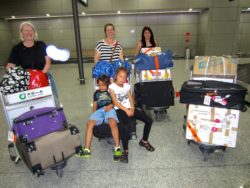
So once more, this time with funding from the NZCFS Rewi Alley Friendship and Exchange Fund to finance the trip, the group set out to visit Bazhong, this time with Marcia almost 18, Takutea almost 8, and Rapanui 6 (the children at Rosy’s expense). The group were taking a load of heavy books for the Grandpa Alley Bookroom in Cambridge Young Learners English School, Bazhong. They flew China Southern Airlines as they were allowed double the luggage allowance of other airlines. (180kg, in all)
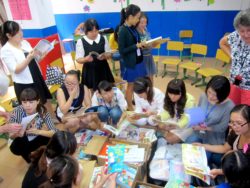
Using some of the RAFE funds new reading books for John’s school and other associated schools in the area were purchased from Kiwik International, a NZ firm in Hong Kong, who gave them good discounts. John He paid for the freight charges from Kiwik, who also kindly deducted their usual charges for Hong Kong handling. Graham Coley, owner of Kiwik, is keenly interested in John and the Rewi Alley connection and hopes to visit the Bazhong school soon.
2014 visit
On arrival, Rosy noticed that the infrastructure of the area is much improved with flyovers, bridges over valleys and gorges and tunnels through the mountains. Many of the villages have many more two-storey white houses, the old traditional ones being left to fall apart. More wealth is evident too with men and women working in the cities sending money home and providing housing and a more comfortable life for the extended families back home: the grandparents remain looking after the children. Rosy finds China eternally fascinating – China is still a country of contrasts though: huge wealth cheek-by-jowl with poverty. They even passed a highly polished Rolls Royce on the road! However, she finds that, more importantly, the general standard of living is indeed rising, year by year.
This time around, they found that the teachers were keen to meet them again and to explain what they had been doing since the last visit. When they discussed the Kiwi method of English teaching, they found that, although the school still uses the State School Text Book, the 2013 and 2014 winter and spring holidays had been devoted entirely to the Kiwi method and the Chinese teachers felt very positive about how it was going. The Kiwis saw that the walls were now decorated with the children’s work and poems, jingles and basic words displayed on the corridor walls.
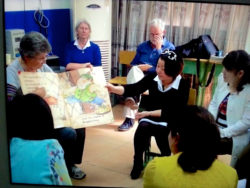
Dave Bromwich, president of the Society, visited one day, and he was given a demonstration of some of the work they had been doing. He is very satisfied with the progress of the work they all have contributed to and as a fillip to all their hard work, was pleased to see some adverts, with photos of Rosy demonstrating reading Big Books, for John’s school, in the city streets. The word seems to be spreading!
She noticed that while the teachers had to be reminded of some of the activities they had previously introduced, they were trying very hard and she feels that after four visits, the teachers are starting to work well with the NZ texts.
Where to from Here?
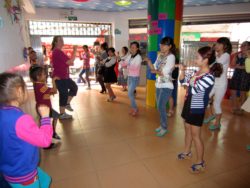
The Kiwi teachers spoke to the Bazhong teachers about improving their own level of spoken English and recommended that they all should watch English movies, radio broadcasts, sound bites from the internet, as much as possible, and practise more with their peers.
There are few native English speakers for them to meet in Sichuan, so John plans to instigate a new regimen, whereby they watch movies in English for half an hour every day. He is also keen that two of his long-term staff, Sophia and Nancy, should come to NZ for a few weeks in 2016. Sophia initially had no idea where New Zealand is. But having contact with the Kiwi teachers has broadened all their horizons and they have learned so much more than just the Kiwi method of teaching. Sophia is now in touch by email with Rosy and is considered a friend and confidante.
However, John’s teachers are now teaching other teachers from other such ‘supplementary’ English schools and John has been asked to supervise English methodology in a friend’s school which may open a branch in Chongqing. Hopefully, the ‘fertiliser’ that NZCFS RAFE fund provided has produced a worthwhile ‘seed crop’ that will bear fruit long term.
“I am sure the teaching will develop its own direction eventually”, Rosy says, “and I think perhaps we have done ourselves out of a job. John is so pleased with the development of his staff that he doesn’t need us any longer! But the friendship is still there. So I will be sure to go back and visit in a year or so, just to see how they are getting on”.
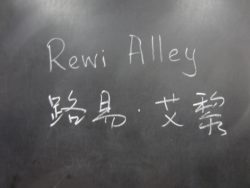
Grandpa Alley’s Book Room
The other part of this year’s RAFE funding was to initiate and develop the pilot ‘Grandpa Alley’s Book Room’. This is to provide a library of English language books for the children in Bazhong, not only for those who attend John’s school. Jan McLeod, knowing that Rewi Alley worked in Sichuan and that Bazhong was a Red Army base during the Long March, came up with the name: “Grandpa Alley’s Reading Room” “艾黎 爷爷的书屋”
John He had already started negotiations with the Bazhong Public Library to enable the group to work in conjunction with the children’s library on their premises.
In April 2014, a planned meeting with library leaders was unfortunately postponed and a further rearranged meeting meant that the main director didn’t attend. After several phone calls to the absent Director, the Party Secretary came in and joined the discussion. The Kiwis were then shown the Children’s Section – a room with TV screen, 80 – 100 Chinese classics and encyclopaedias and some comics and magazines. The only picture books were Chinese translations of Beatrix Potter. The library was only open on Saturdays and Sundays. John said it would take several meetings to convince people that a public space can be used for the people! A new idea takes time!
However, NZCFS member, Alistair Shaw is helping Jan with selected images from the Shanghai Photo Exhibition on Rewi’s Life to explain the name of the Reading Room to local kids and parents and also to promote NZCFS and New Zealand in Bazhong. Hopefully, it will have an encouraging effect on the Library officials!

The books for the library would have to be collected back home, so Rosy set about getting children’s picture books from second hand sources; friends, home libraries, primary school libraries, Red Cross book sales, Op shops and other second hand book sellers throughout NZ. The remaining RAFE funding could now be used to buy new teaching texts and for the necessary freight.
Unfortunately, the powers-that-be seem reluctant to set up a separate Bazhong Children’s library so that John has decided to set aside a room in his school for the local children to benefit, not just his school.
On a personal note, Marcia, Emily’s eldest child, celebrated her 18th birthday whilst they were there with a Sichuan hot-pot (VERY spicy!) and a huge birthday cake – something they will all remember for many years to come.
Rosy Look


